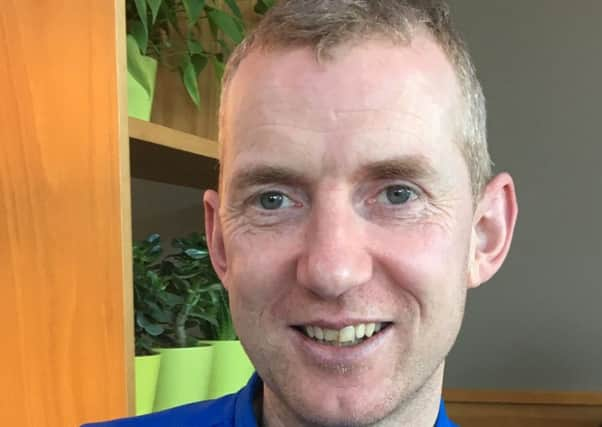'˜I couldn't even say '˜blind' after my diagnosis... I called it the '˜B' word'


In 2000 Lurgan man Brian Lenehan went to university in Liverpool, settled there and embarked on the world of work. He was enjoying life and was ‘‘sport mad’’, with a particular passion for Gaelic football.
So far, his story is unremarkable. But that all changed in an instant when he collided with another player during a game of football.
Advertisement
Hide AdAdvertisement
Hide AdBrian (41) recalls: “I woke up the next morning and my central vision was gone. It was like having a 10p piece in front of each eye.”
He adds: “I thought ‘this isn’t good’ but I reasoned that it was all part of the impact I’d taken on the pitch and it would go away by itself in a few hours, or days.”
Gradually, Brian shifted from ‘waiting to see if it improves’ to actively avoiding seeking medical advice out of fear for almost a year.
“I was working in the Psychology Department at Liverpool University,” he explains. “There were huge amounts of data to get through and I simply wasn’t coping.
Advertisement
Hide AdAdvertisement
Hide Ad“You can imagine that working with spreadsheets with no central vision isn’t the easiest! I was utterly exhausted and I did something stupid – I Googled my symptoms.”
Convinced something serious was wrong, Brian reluctantly went to his GP. He was referred for an MRI scan but it was cancelled the morning it was due to take place. “I was so relieved,” he remembers.
“It sounds crazy but it was a weight off my mind not to have to deal with it that. I could put off finding out for a little longer.”
Matters came to a head in December 2013, when Brian came home to Northern Ireland for Christmas. His family noticed something wasn’t quite right and, after a frank discussion, it was agreed that he would move home.
Advertisement
Hide AdAdvertisement
Hide AdAfter various tests and scans with a local consultant, Brian was diagnosed with a rare condition called Neuromyelitis optica (NMO) which, until recently, was considered a form of Multiple Sclerosis.
It’s thought that the impact Brian suffered playing football could have been the catalyst for the onset of the condition. Currently, he still has peripheral vision but, without any meaningful central vision, he describes it as ‘a life without detail’.
“When the consultant finally gave me the diagnosis I just said ‘oh, okay’,” Brian explains. “But when I got home and it sunk in a bit, the floodgates opened. The permanence of it all really hit me and the possibility that my vision could go completely was terrifying.”
He adds: “Suddenly, everything became a hazard to me. I was afraid if I bumped into someone in the street I might have another episode and lose my remaining sight. I stayed in the house but, even then, I restricted myself to certain places that I thought would be safest. I was slap bang in the middle of depression but, with a background in working in mental health,
Advertisement
Hide AdAdvertisement
Hide Ad‘‘I was able to put on a mask and pretend to people on the outside that I was okay.”
The turning point came for Brian when he attended a Guide Dogs ‘client day’ in 2016. Until then, he had refused to learn how to use a long cane and admits that he ‘almost pulled the plug’ on attending the event that morning.
“Steve and Millicent, the Orientation and Mobility Specialists from Guide Dogs, were so, so patient with me,” he remembers. “When I was having bad days, they understood and they didn’t give up on me. They instilled confidence in me, listened to my fears and let me go at my own pace.
“When I walked through the door at the client day it was a watershed moment. For a long time, I couldn’t even say ‘blind’, I called it the ‘B word’.
Advertisement
Hide AdAdvertisement
Hide Ad“But that day I saw so many other people, many of them with no sight at all, coping well, getting on with life and looking happy. It was so humbling.”
A short time later, Brian agreed to start long cane training and even re-ignited his passion for sport by taking up mountain biking with his brother.
Now, he’s been working at Disability Sport NI since March 2017 and is on the waiting list for a guide dog to help him become even more independent.
“It sounds silly but I miss being able to ‘wing it’,” he says. “I have to think a lot more about things now, like planning my journeys.
Advertisement
Hide AdAdvertisement
Hide Ad“The cane helps me get from A to B but, obviously, it’s not alive! I think having a dog by my side will help me get back some of that spontaneity and having someone to share the minute-by-minute of my day will be lovely.
“Even a year ago, I would have struggled to tell my story but now, with the support of Guide Dogs and my family, life is good. You can’t ask for much more than that.”
To find out more and support he work of Guide Dogs, visit www.guidedogs.org.uk